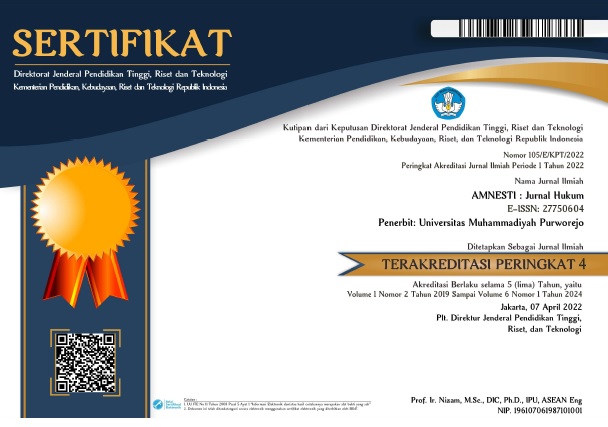The Comparison of Educational Rights between State Constitutions of Indonesia and Singapore
Abstract
The constitution is the basis for a country which contains various kinds of human rights, one of which is the right to education. This study aims to find out the need for education and the constitutional comparison of the right to education applied in Indonesia and Singapore. The research uses a normative juridical approach with a comparative approach. This study aims to analyze the comparison of the constitutional rights to education applied in Indonesia and Singapore. It can be seen that the state of Singapore has succeeded in implementing reforms in education rights properly. We can see this in the quality of education in Singapore, which is in the top ranking among countries with the highest attainment of international education standards. Meanwhile, the Indonesian state still has to struggle to achieve the goal of implementing the right to education properly. The results of the different implementation of education between the two countries are due to different backgrounds, such as social, political, cultural, and economic conditions. Therefore, it can be concluded that many factors influence the success of implementing the right to education in a country.
Downloads
References
Amedi, A. M. (2018). Analisis Politik Hukum Pendidikan Dasar di Indonesia Demi Menyongsong Era Tujuan Pembangunan Berkelanjutan (Sustainable Development Goals/SDGs). Padjadjaran Law Research, 6, 38–55.
Anggraini, W., & Hudaidah, H. (2021). Reformasi Pendidikan Menghadapi Tantangan Abad 21. Journal on Education, 3(3), 208–215. https://doi.org/10.31004/joe.v3i3.363
Arikewuyo, O. (2004). Democracy and University Education in Nigeria: Some Constitutional Considerations. Higher Education Management and Policy, 16(3), 121–134.
Arwildayanto, Suking, A., & Sumar, W. T. (2018). Analisis Kebijakan Pemerintah. Cendekia Press.
Effendi, S. (2011). Konstitusionalisme dan Konstitusi Ditinjau dari Prespektif Sejarah. Humanus, X(1), 73–81.
Faiz, A., & Kurniawaty, I. (2022). Urgensi Pendidikan Nilai di Era Globalisasi. Jurnal Basicedu, 6(3), 3222–3229. https://doi.org/10.31004/basicedu.v6i3.2581
Halawa, D. P., Telaumbanua, M. S., & Buulolo, D. (2023). Perbandingan Sistem Pendidikan Indonesia dan Jepang. NDRUMI: Jurnal Pendidikan Dan Humaniora, 6(1), 12–23.
Kharisma, M. R. (2021). Development of Human Rights Constitution Materials: a Comparative Study of Indonesia, Singapore and People’S Republic of China. Jurnal Poros Hukum Padjadjaran, 2(2), 342–365.
Kurniawati, F. N. A. (2022). Meninjau Permasalahan Rendahnya Kualitas Pendidikan Di Indonesia Dan Solusi. Academy of Education Journal, 13(1), 1–13. https://doi.org/10.47200/aoej.v13i1.765
Lee, S. S., Hung, D., & Teh, L. W. (2013). Moving Singapore from Great to Excellent: How Educational Research Informs This Shift. KEDI Journal of Educational Policy, 10(2), 267–291.
Lestari, S. (2018). Peran Teknologi dalam Pendidikan di Era Globalisasi. Edureligia: Jurnal Pendidikan Agama Islam, 2(2), 94–100. https://doi.org/10.33650/edureligia.v2i2.459
Marzuki, P. M. (2011). Penelitian Hukum. Kencana Prenada Media Group.
Rasyidi, A. F. (2017). Implikasi Pengabaian Hak Sipil dan Politik Masyarakat Moro-Moro dalam Pemilihan Kepala Daerah. Jurnal HAM, 8(1), 39–50. https://doi.org/10.30641/ham.2017.8.39-50
Sa’adah, M. (2019). Studi Komparatif Reformasi Pendidikan di Singapura dan Indonesia. Jurnal Pembangunan Pendidikan: Fondasi Dan Aplikasi, 7(1), 71–79. https://doi.org/10.21831/jppfa.v7i1.26499
Wahda, J. (2015). Sistem Pendidikan Nasional Indonesia Tidak Mengenal ‘Adab.’ Jurnal TAWAZUN, 8(1), 103–116.
Wijaya, H. (2019). Redefining the Success of Education: Where Indonesia Has Excelled and Where It Has Not. Jurnal Humaniora, 31(2), 118–129. https://doi.org/10.22146/jh.v31i2.36532
Copyright (c) 2023 Amnesti: Jurnal Hukum

This work is licensed under a Creative Commons Attribution-NonCommercial 4.0 International License.






